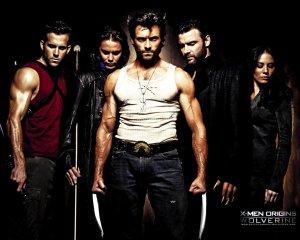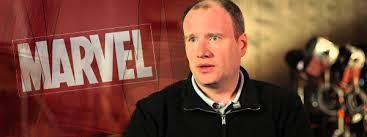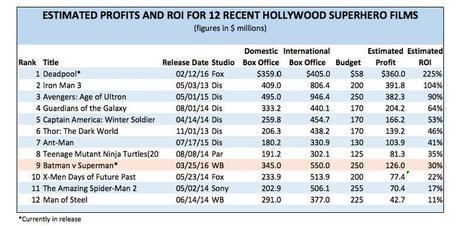This wasn’t supposed to happen. When Warner Bros. picked 3/25/2016 as the release date for Batman v Superman: Dawn of Justice, they thought they were guaranteeing themselves at least three weeks of complete box office dominance. Our moveigoing money was theirs to have until The Jungle Book’s 4/15/16 domestic release date. The rest of Hollywood even conceded defeat. BvS had its opening weekend mostly to itself, with the only other new wide release being Universal’s female-leaning, counter-programming effort My Big Fat Greek Wedding 2. God’s Not Dead 2 and Meet the Blacks were but mere flies for BvS to swat away in its second weekend. The Boss would do the Melissa McCarthy thing and open over $20m, but that surely wouldn’t be enough to fell BvS‘s third weekend.
Funny thing about that, though. For all of that to go according to plan, BvS needed to deliver at least a minimal level of quality, but that did not line up with the actual product Zack Snyder and WB delivered. As a result, The Boss knocked BvS from its box office perch this weekend. The Sunday estimates had them at a virtual tie, but here’s what Variety said yesterday afternoon once the actual totals came in:
Monday’s final numbers placed Universal’s “The Boss” at $23.58 million for its opening, while Warner Bros.’ “Batman v Superman” finished its third weekend in second place with $23.34 million. That left the contenders with a slightly wider gap than on Sunday, when Warner Bros. distribution exec VP Jeff Goldstein insisted that the third weekend of the superhero movie would come out on top.
That is still a rather minuscule difference. So it’s not like The Boss absolutely trounced BvS. However, $23.58m is the second lowest opening for any of Melissa McCarthy’s starring role movies (Tammy‘s $21.5m is the lowest), and it was still good enough to beat BvS.
That marks a -54.5% third weekend decline for BvS after a stunning -69% drop in its second weekend. Below is a list of how that compares to the 8 other major comic book movies of the past 20 years to have declined at least 65% in their second weekend:
Weekend 2nd Weekend
Drop 3rd Weekend Drop 4th Weekend Drop
1 Hellboy II: The Golden Army (2008) $34.5M ▼ 70.7% ▼ 49.6% ▼ 51.2%
2 Hulk (2003) $62.1M ▼ 69.7% ▼ 56.3% ▼ 55.4%
3 Batman v Superman (2016) $166M ▼ 69.1% ▼ 54.5% ???
4 Origins: Wolverine (2008) $85M ▼ 69.0% ▼ 44.3% ▼ 45.1%
5 Fantastic Four (2015) $25.6M ▼ 68.2% ▼ 54.3% ▼ 52.3%
6 Kick-Ass 2 (2013) $13.3M ▼ 67.2% ▼ 55.4% ▼ 67.4%
7 X-Men: The Last Stand (2006) $102.7M ▼ 66.9% ▼ 52.7% ▼ 51.4%
8 Green Lantern (2011) $53.1M ▼ 66.1% ▼ 63.6% ▼ 52%
9
Fantastic Four: Rise of the Silver Surfer (2007)
$58M
▼ 65.5%
▼ 54.3%
▼ 53.6%
Of course, comparing week-to-week drops is never fair because there’s no way to account for all of the differing variables (e.g.,level of hype, time of year, franchise history). For example, the competition BvS has faced as a movie released at the end of March is entirely insignificant compared to that faced by summer movies like Origins: Wolverine, The Last Stand and Green Lantern. However, those summer releases obviously had the benefit of coming out a time when kids were out of school, unlike BvS, which did the best it possibly could in that department by timing its release to at least overlap with Spring Break. Plus, The Last Stand is the only other entry on that list to open above $100m meaning it’s the only one which had nearly as far to fall from as BvS.
 That being said, of the steeply declining superhero movies Origins: Wolverine is the only one which managed to significantly recover after a big second-weekend decline. BvS does not appear as if it will be an outlier in that regard. Instead, it should be expected to decline another 50-55% next weekend, and at that rate it will fall short of Deadpool’s $358 domestic total.
That being said, of the steeply declining superhero movies Origins: Wolverine is the only one which managed to significantly recover after a big second-weekend decline. BvS does not appear as if it will be an outlier in that regard. Instead, it should be expected to decline another 50-55% next weekend, and at that rate it will fall short of Deadpool’s $358 domestic total.
Eh, so what? After 17 days, BvS is still looking at domestic ($296m) and worldwide ($788) totals which ranks it as the 13th highest grossing superhero movie of all time domestically and 8th highest worldwide. It’s already eclipsed Man of Steel ($291m) domestically and Deadpool ($756m) worldwide. On top of that, it grossed $34 million in 67 international markets this weekend.
Yeah, but look at how quickly it’s fallen from #1 in most of those foreign countries, keeping in mind that it came out pretty much everywhere around the world at the same time. While we just rejected BvS in favor of The Boss other countries are turning on it just as fast.
Among the 19 international territories whose Apr. 8-10 weekend box office totals have been tracked by BoxOfficeMojo thus far, BvS is only listed as the #1 movie in Bulgaria, Finland, Norway, Romania and South Africa. Otherwise, it has been usurped by local competition (e.g., Teorie Tygra in the Czech Republic, Assassination Classroom in Japan, Hunt for the Wilderpeople in New Zealand), leapfrogged by older movies (e.g., Kung Fu Panda 3 in Lithuania, Slovenia, Zootopia in South Korea) and pushed aside by early releases for Hollywood blockbusters (e.g., The Huntsman Winter’s War in Australia, Italy, Mexico, Netherlands, UK, The Jungle Book in the Ukraine). Rather significantly, BvS also declined 77% in China last weekend, taking third place behind two local entries (The Bodyguard, Chongqing Hot Pot).
All Warner Bros. has proven with Batman v Superman is that the film’s built-in brand awareness engendered an amazing level of good will and curiosity among fans around the world. As such, it made $166m at home and $250m abroad in its first 3 days; it’s made $130m at home and $234m abroad in the 14 days since then, and those numbers won’t significantly grow now that Jungle Book and Huntsman are baring down on us.
 When io9 recently asked Kevin Feige how he would have reacted if The Avengers had been similarly front-loaded and panned by fans/critics he noted how important fan buy-in is to your sustainability when trying to build a cinematic universe:
When io9 recently asked Kevin Feige how he would have reacted if The Avengers had been similarly front-loaded and panned by fans/critics he noted how important fan buy-in is to your sustainability when trying to build a cinematic universe:
Realistically, I don’t know. I think [Warner Bros.] is in a very different position than we were, when we were doing those early movies. We were just trying something, and now there’s a golden ring to try to grab.
But I’ve always believed, since Iron Man 1, that things have got to work. Things have got to work, or people won’t let us make another one. I don’t think that’s the case for [DC].
But several financial analysts have taken a cold, hard look at the bottom line and determined WB will ultimately realize a profit from BvS even if it falls short of $1 billion worldwide. However, they actually disagree how much of a profit there will be, and whether or not it will be more than what the studio saw from Man of Steel.
Forbes’ Rob Cain, a “former studio executive and current film finance consultant and producer,” put together the following chart to show where BvS will likely rank among superhero movies of the past 8 years, at least those movies with enough available information to compute ROI:
 Financial analyst Wade Holden of SNL Kagan sees it turning out quite differently. His projections “once home video, TV and merchandise proceeds” are accounted for give Dawn of Justice a profit of about $278 million for the studio, which is less than the $300 million he estimates they made on Man of Steel. I am currently unclear as to why exactly Cain and Holden’s results are so different, but regardless of what the profit figure turns out to be – $126m or $278m – I recognized the extreme wisdom in Cain’s words of caution:
Financial analyst Wade Holden of SNL Kagan sees it turning out quite differently. His projections “once home video, TV and merchandise proceeds” are accounted for give Dawn of Justice a profit of about $278 million for the studio, which is less than the $300 million he estimates they made on Man of Steel. I am currently unclear as to why exactly Cain and Holden’s results are so different, but regardless of what the profit figure turns out to be – $126m or $278m – I recognized the extreme wisdom in Cain’s words of caution:
We need to remember that it takes years for all this money to flow in to the studio’s coffers. The $250 million in production funding is spent long before the movie’s release, and the marketing money is also a big upfront cost. The theatrical rental revenue usually comes back inside of a year after the film’s release, but home entertainment revenue can take several years to trickle in, and TV revenue years more. Taking into account the time value of money, the IRR on Warners’ investment is probably in the range of 12 to 15 percent. And that’s before we count the studio’s overhead costs, which if amortized against the picture would probably reduce the Batman v Superman profits by another $30 or $40 million.
Perhaps I’ve now overwhelmed you with accounting terms. So let’s cut to the chase.
When Zack Snyder suddenly switches course and hires Game of Thrones‘ Fabian Wagner to be his cinematographer for Justice League-Part 1 instead of longtime collaborator and BvS DP Larry Fong you can accept the official explanation about “scheduling conflicts.” You can reason Fong was likely too busy with Kong: Skull Island to devote enough prep time to Justice League, and remember that scheduling challenges kept him off of Man of Steel but opened up for him to do BvS. Or you can look at the box office figures as well as Variety’s recent insider report (“I’m told production exec Jon Berg and Time-Warner CEO Jeff Bewkes are taking more of a hands-on approach now, paying closer attention to overarching story concerns”) and guess that something more is happening here than they’re letting on. It could just be a coincidence, but WB has earned our skepticism.
From a bottom-line perspective, Forbes concluded BvS will be a modest success, and “if WB can contain its production costs and talent participation expenses on future Justice League films, do a bit better in holding on to the domestic audience, and then gain back the interest of overseas moviegoers–especially the massive Chinese market–then they should do just fine financially.” In other word, they need to make better movies for far less money because when BvS ends up on a list of futility with franchise killers (Hellboy 2, Rise of the Silver Surfer, Kick-Ass 2) and non-starters (Green Lantern, Fantastic Four) you’re entering into uncharted territory. Superhero movies which decline as quickly as BvS don’t go straight into big budget sequels. Instead, they take time off and reboot many years down the line. Instead, WB is trying to course-correct on the fly. Um, good luck with that.
BvS might deliver an acceptable return on financial investment, but the fan investment will not be so easily repaired. Save us, Suicide Squad and Wonder Woman. You’re WB’s only hope.

